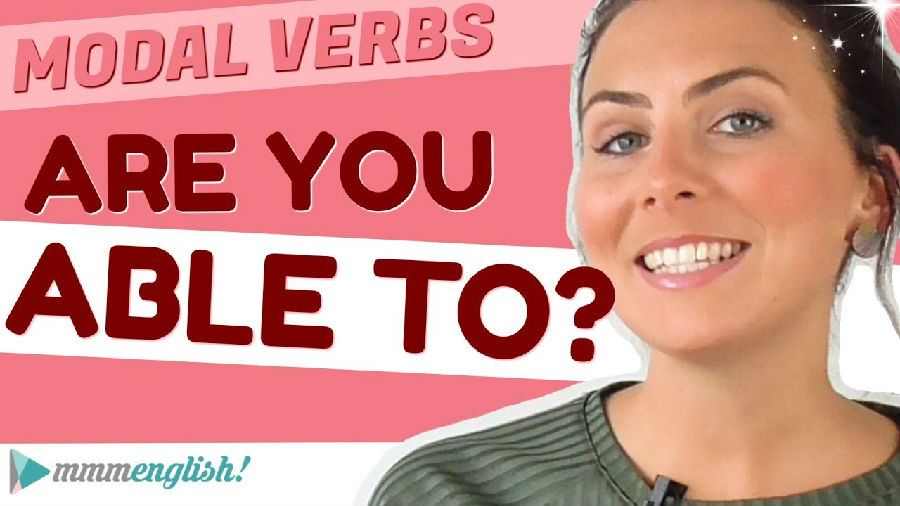Hello, I'm Emma from mmmEnglish!
大家好,我是Emma,欢迎来到Emma的美味英语!
Last week, my lesson was about using modal verbs to express possibility and probability.
上周我的课程是关于使用情态动词来表达可能性。
If you haven't seen it, make sure you check it out after this lesson.
如果你还没看那节课程的话,下课之后别忘了看一下哦。
I'll link to it at the end of this video.
我会在视频结束给大家上节课的链接
So, we'll continue talking about modal verbs today, but this time modal verbs that express ability.
所以,我们今天继续讨论情态动词,但这次我们要讲表达能力的情态动词。
Now, it's important to know that one modal verb can be used to express different things in English.
现在,重要的是要知道英语中的情态动词可以表达不同的意思。
So, for example, the modal verb ‘can‘ is used to express possibility
例如,情态动词can可以用来表示可能性,
but in this lesson today, I'll explain how it expresses ability.
但在今天的这节课中,我将向大家解释can是如何表达能力的。
And then later, you'll learn that ‘can‘ can also be used to ask permission, make requests and offer help.
然后,你会发现“can”也可以用来表示请求许可、提出请求和提供帮助。
So, it's a pretty useful modal verb!
所以,这是一个非常有用的情态动词!
To express ability in English, you need to use these verbs:
你需要使用这些情态动词来表示英语之中的能力:
can
can(可以)
can't
can't(不可以)
could
could(可以)
couldn't
couldn't(不可以)
and (be) able to
以及be able to(有能力做)
Now, ‘can‘ and ‘can't‘ are pretty simple.
“Can”和“Can't”这两个都非常简单。
They're both used to express ability in the present tense.
它们都是用来表示能力的现在时。
You can speak English.
你可以说英语。
My mum can pick us up.
我的妈妈可以来接我。
I can ask my brother for help.
我可以找我哥哥寻求帮助。
We also use ‘(be) able to‘ to express the same thing.
我们还会使用“be able to”来表达相同的意思。
You are able to speak English.
你可以说英语。
My mum is able to pick us up.
我的妈妈可以来接我。
I am able to ask my brother for help.
我可以找我哥哥寻求帮助。
But notice that the ‘be‘ verb conjugates to the subject when we're using ‘(be) able to'.
但是请注意,使用 “(be) able to”的时候,如果和不同的主语搭配,“be”动词的形式要进行相应地改变。
But, when you're using the modal verb ‘can' it doesn't matter what the subject is.
但是,当你使用情态动词can时,主语是什么并不重要。
The modal verb is always the same.
情态动词形式永远是相同的。
And this is true for all modal verbs.
所有情态动词都是如此。
They have just one form.
他们只有一种形式。
Now, the present tense is simple.
现在时态很简单。
But, when we talk about ability in the past, we need to pay closer attention to the rules.
但是,当我们讨论过去的能力的时候,我们需要注意这些规则哦。

Because we use ‘could‘ to talk about general ability
因为我们需要使用“could”来讨论过去一般能力,
and we use ‘was/were able to‘ to talk about specific ability in the past.
使用“was/were able to”讨论过去的更加特殊能力。
To express yourself correctly, you need to understand what is general ability and what is specific ability?
想要正确地进行表达的话,你需要理解什么是一般能力,什么是特殊能力。
If someone had the ability to do something, at all times and in many different situations, then this is a general ability.
如果有人无论在什么时候,在什么情况下都有做某件事情的能力,那就是一般能力。
She could read by the time she was five.
她五岁时就能读书了。
She could read anything! Books, newspapers, letters, anything!
她什么都能读!书,报纸,信件,任何东西!
This is a general ability so ‘could‘ is the correct choice here.
这是一种一般能力,所以这里应该使用“could”。
Now, if someone had the ability to do something at a specific time, in a specific situation, well, this is specific ability.
如果有人在某个特定的时间、特定的情况下有能力做某件事,那么这就是特殊能力。
She was able to read Little Red Riding Hood in front of the class.
她可以在全班面前朗读小红帽。
This is a specific situation.
这是特殊的情况。
So when you're talking about a specific ability ‘to be able to‘ is the correct choice.
当你讨论特殊能力的时候,“be able to”才是正确的选择。
So, in these examples, we used different words to express ability in the past.
所以,在这些例子中,我们用不同的词来表达过去的能力。
It's a little trickier, isn't it?
有一点复杂,是吧?
But fortunately, the negative form is the same in general and specific situations in the past.
但幸运的是,描述过去的一般和特殊能力的否定形式是一致的。
It's just ‘couldn't‘.
就是“couldn't”。
She couldn't read by the time she was five.
她五岁的时候还不能阅读。
She couldn't read Little Red Riding Hood in front of the class.
她无法在全班面前读小红帽。
Note that when someone had the ability in the past, but they didn't use it, we use a different structure.
请注意,当某人过去有这种能力,但是他们并没有使用这种能力,我们要使用不同的结构。
We use ‘could' with ‘have' and the past participle form.
我们用“could”加“have”再加过去分词形式。
I could have helped you, but you didn't ask me!
我本来能够帮助你,但是你没有向我寻求帮助!
We could have invited more people. There's spare seats at the back!
我们本来能够邀请更多的人的,后面还有空座呢!
Okay, let's just pause for a moment and think about all of this new information that you've taken in.
好吧,让我们暂停一下,想想你学到的所有这些新信息。
I think we should probably practise expressing ability in the past tense just for a moment before we move on.
我觉得在继续之前,我们可能需要稍微练习一下用过去时表示能力。
So, what you need to do is choose the correct word to complete the sentence. Okay.
你需要做的就是选择正确的单词完成句子,好的











